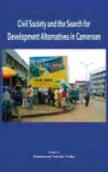Civil Society and the Search for Development Alternatives in Cameroon
Keywords:
Civil Society, Development Alternatives, CameroonSynopsis
CODESRIA, ISBN: 978-286978-220-4 ; 227 pages, 2008
Recent developments have witnessed the emergence of civil society as a major development actor whose potentials and capacity, especially in Africa, are often taken for granted and treated as limitless.
A critical assessment of some of their structures (NGOs, religious organisations, trade unions, home-based associations, women’s mobilisation structures, local community organisations, and the youth) and the legal and political context of the operation of civil society in Cameroon shows a popular effervescence that is visible in social development initiatives; Although this would complement the state and free enterprise, it is however often frustrated by the state’s suspicion in a context of rising social awareness and protest that is assimilated with political opposition or attempts at manipulation along partisans lines.
This book is a call to reform the framework and civil society to assess its components and roles in shaping the future of Africa.
Chapters
-
Introduction
-
A Balance Sheet of Economic Development Experience since Independence
-
The Legal Framework of Civil Society and Social Movements
-
The Evolution of Trade Unionism and the Prospects for Alternatives to the Labour Question
-
Religious Organisations and Differential Responses to the Economic CrisisThe Roman Catholic Church and the Full Gospel Mission
-
On the Viability of Associational Life in Traditional Society and Home-Based Associations
-
Traditions of Women’s Social Protest Movements and Collective MobilisationLessons from Aghem and Kedjom Women
-
Micro-credit, Financial Sector Reform and Welfare
-
Focus and Quality of NGOs as Partners in Development
-
NGO Involvement in Environmental Protection in the North West Province
-
Political Leadership, State–Civil Society Relations and the Search for Development Alternatives
-
The Youth, the Challenge of the New Educational Order and Development Alternatives
-
Towards a Synthesis
Downloads
References
Amin, S., 2000, ‘Economic Globalisation and Political Universalism: Conflicting Issues’, Journal of World-Systems Research, Vol.1, No 3, Fall/Winter.
Amin, S., 2001, ‘Une radicalité démocratique’, http://humanité.fr/journal/2001-01-29/ 2001-01-29-238694.
Breytenbach, Willie, 1998, ‘The Erosion of Civil Society and the Corporatisation of Democracy in Africa’, QUEST, Vol.XII, No. 1, Special Issue: Proceedings of the Interdisciplinary Colloquium on State and Civil Society in Africa. Abidjan, 13-18 July.
Craig, G., 1998, ‘Community Development in a Global Context’, Community Development Journal, Vol. 33, No. 1.
Ferréol, G., P., Cauche, J-M., Dupez, N., Gadrey and M. Simon, 1995, Dictionnaire de Sociologie, Paris: Armand Colin/Masson.
Freire, Paulo, 1985, Pedagogy of the Oppressed, New York: The Continuum Publishing Corporation.
Houtart, F., 1998, ‘Editorial’, Les Cahiers Alternatives Sud, Vol. V, No. 1.
Mamdani, Mahmood, 1995, ‘A Critique of the State and Civil Society in Africanist Studies’, in Mahmood Mamdani and Ernest Wamba-dia-Wamba, eds., African Studies in Social Movements and Democracy. Dakar: CODESRIA.
Mohan, Giles, 2002, ‘The Disappointments of Civil Society: the Politics of NGO Intervention in Northern Ghana’, Political Geography, 21.
Néveu, Erik, 2000, Sociologie des mouvements sociaux, Paris: La Découverte.
Osaghae, Eghosa E., 1998, ‘Structural Adjustment, Civil Society and National Cohesion in Africa’, AAPS Occasional Paper Series, Vol. 2, No. 2.
Tejada, Aurelio Alonso, 1998, ‘Le Concept de société civile dans le débat contemporain: les contextes’, Les Cahiers Alternative Sud, Vol. V, No. 1.
Tostensen, A., Inge Tvedten and Mariken Vaa, 2001, ‘The Urban Crisis, Governance and Associational Life’, in Tostensen, A., Inge Tvedten and Mariken Vaa, eds., Associational Life in African Cities: Popular Responses to the Urban Crisis, Uppsala: Nordic Africa Institute.
Touraine, A., 1974, Pour la Sociologie, Paris: Seuil.
Touraine, A., 1991, ‘Entretien’, Revue Sciences Humaines, http://www.cybertribes.com/touraine.htlm
Touraine, A., 1996, ‘Entretien avec Alain Touraine sur “Smart Geneva” et la société de l’information’, http://diwww.epfi.ch~galland/articles/Touraines.htlm
Vilas, Carlos V., 1998, ‘L’heure de la société civile’, Les Cahiers Alternatives Sud, Vol. V, No. 1.
Yenshu Vubo, Emmanuel, 1998a, ‘The Evolution of Official Attitudes towards Grassroots Initiatives in Cameroon’, Community Development Journal, Vol. 33, No. 1.
Yenshu Vubo, Emmanuel, 1998b, ‘The African Woman and the Development Crisis: An appraisal of Changes, Constraints on Empowerment and Prospects for the Future’, in Simo, David, ed., La politique de development à la croisée des chemins: le facteur culturel, Yaoundé: Goethe Institut/Editions Clé.
Yenshu Vubo, Emmanuel, 1997, ‘Democratizing Development in Sub-Saharan Africa: Imperatives and Possibilities’, Scandinavian Journal of Development Alternatives and Area Studies, Vol. 16, No. 2, June.






